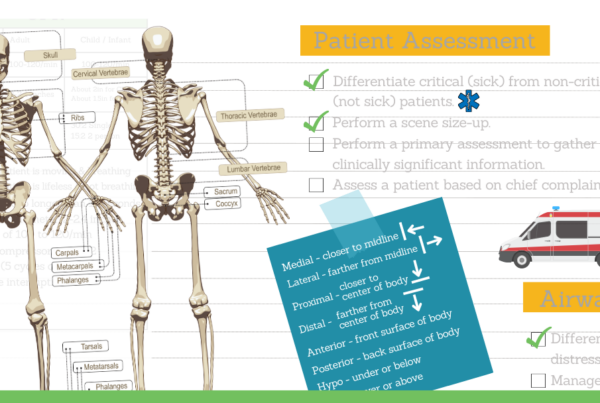By Dan Limmer
I took the National Registry paramedic exam Friday to get my Texas EMS license. While integrity (and the NREMT rules) don’t allow me to tell you any of the exam content, I do have a few takeaways that I’d like to share with you.
I passed at 80 questions. This is a good thing. I can’t imagine how I would explain failing as a 40-year paramedic and the Chief Knowledge Officer of an exam preparation company. But it did help me recreate the nerves many people feel going into the NREMT exam. The nerves are significant—and expected—for the candidate as they enter the test center and sit in front of the computer.
Some Thoughts and Observations about the NREMT
I found that there were three categories of questions for me:
- I definitely knew the answer
- I was pretty sure I knew the answer
- I had to take an educated guess at something that looked familiar.
During the examination, I also found that I didn’t immediately identify that the questions were getting more difficult. It wasn’t until after I got out that I looked up a couple of things to check myself and realized that it was some pretty obscure, deep-cut material. Fortunately, my educated guesses, in many cases, were correct.
I didn’t realize that the questions were getting more difficult because I was very focused on answering each of the questions. The advice I give candidates proved successful for me:
- Answer each question to the best of your ability, then move on. Don’t ruminate over a question in the past. It clogs your head for the future.
- Take your time.
I am convinced that I finished the exam in the minimum number of questions because I took my time. I took an average of 1 minute per question, well over what the NREMT says is average (31 seconds). I’m glad I did because there were two simple questions I decided to reread before I clicked next, and I would have gotten them wrong because I either jumped to the answer or clicked the wrong answer. One was as simple as the difference between right and left.
NREMT Topics to Study
I believe I can say without compromising my integrity or NREMT rules that you should know pathophysiology. The NREMT is masterful in item creation. As an educator, I found myself in awe of some of the questions. They ask you to apply pathophysiology by predicting outcomes of things on the first read that didn’t seem related—but they were.
My students at the AEMT level have reported a lot of acid-base questions, and I would confirm that observation. You should know the Glasgow Coma Score. You should also expect a fair number of questions that could also be found on an EMT or AEMT exam. Operations is operations regardless of the exam level.
The exams are said to be 15% pediatric questions, and I felt like I had all of that—and then some.
I think I can say what I didn’t have on the paramedic exam. I didn’t have a ton of OB questions, no rule of 9s questions, no big med calc questions where I had to use the paper or the on-screen calculator.
![]() Taking the exam did allow me to compare it to our paramedic apps. I will vouch for what former NREMT executive director Bill Brown says about his Paramedic PASS app. It is, in fact, more difficult than the NREMT exam. If you rock that, you will rock the exam. I found the question styles were very similar. You would get several 3 or 4 sentence scenario questions followed by a pithy, one-sentence question. But I felt that as I took a few sections of Paramedic PASS before the exam too. (If you’re not at the paramedic level yet, there’s also EMT PASS and AEMT PASS.)
Taking the exam did allow me to compare it to our paramedic apps. I will vouch for what former NREMT executive director Bill Brown says about his Paramedic PASS app. It is, in fact, more difficult than the NREMT exam. If you rock that, you will rock the exam. I found the question styles were very similar. You would get several 3 or 4 sentence scenario questions followed by a pithy, one-sentence question. But I felt that as I took a few sections of Paramedic PASS before the exam too. (If you’re not at the paramedic level yet, there’s also EMT PASS and AEMT PASS.)
Best Answer vs. Correct Answer on NREMT Questions
Finally, I contemplated the best answer versus the correct answer discussion that the NREMT has been having. I’ll stick with the conclusion in my prior blog post about that. The questions are expertly crafted, demanding, and fair. The reason for that is because the distractors are better than are found in instructor-created exams and publisher’s exam banks. (My EMT book has good questions, FYI…) I never felt they were trying to trick me, that they were unfair, or unrealistic.
It did make me realize that 80 questions can’t possibly cover a scope of practice as big as the paramedic level.
It was a good experience. I’ve been preparing students for the NREMT for more than 30 years…and don’t even remember anything about when I took it last. As a life-long student, I was challenged. As an educator and author, it has helped my perspective. As one of the Limmers in Limmer Education, it confirmed we are on the right track.
Yes, I was nervous. Yes, I am thrilled I passed. Yes, I am glad I don’t have to do it any time again soon.



Congrats Dan! Keep up the great work. 👌👍
Way to go!!!!!
Thx for the advice
Woo-hoo! Congrats, Dan.
I recently took the paramedic exam myself. Though I didn’t stop at 80 questions like Dan did, I got the opportunity to fully experience the exam at 150 questions with about 3 minutes left. I’m thankful that that test is done! I did pass however. The content was very similar to what you just discussed. I am also glad I was told about this app by a fellow student. It help immensely for the exam. I never thought I would be testing at age 53, but very glad I did!
I also recently took the exam and had all 150 questions. Passed also, what a relief!
I’m also an EMT instructor and just took the NREMT. Mine didn’t shut off at 80 questions… kept going.. and I started getting really easy questions. So I was freaking out that somehow I was blowing it. How embarrassing would that be? Then I realized that the online at-home version of the test is not adaptive. Ha! I guess I should have read the fine print. But I passed! And I agree with everything you say here.